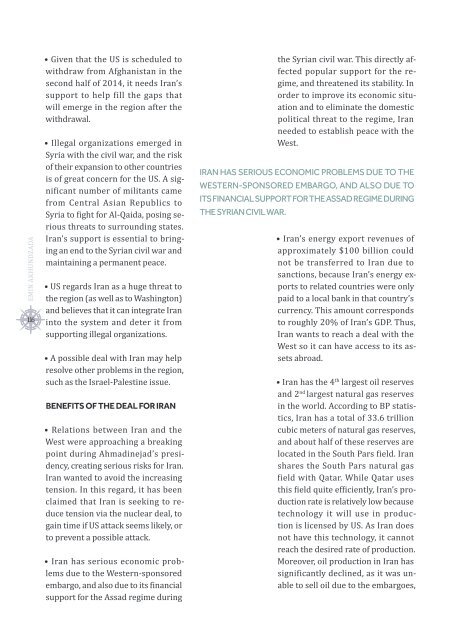Caspian Report - Issue 06 - Winter 2014
Create successful ePaper yourself
Turn your PDF publications into a flip-book with our unique Google optimized e-Paper software.
EMIN AKHUNDZADA<br />
116<br />
• Given that the US is scheduled to<br />
withdraw from Afghanistan in the<br />
second half of <strong>2014</strong>, it needs Iran’s<br />
support to help fill the gaps that<br />
will emerge in the region after the<br />
withdrawal.<br />
• Illegal organizations emerged in<br />
Syria with the civil war, and the risk<br />
of their expansion to other countries<br />
is of great concern for the US. A significant<br />
number of militants came<br />
from Central Asian Republics to<br />
Syria to fight for Al-Qaida, posing serious<br />
threats to surrounding states.<br />
Iran’s support is essential to bringing<br />
an end to the Syrian civil war and<br />
maintaining a permanent peace.<br />
• US regards Iran as a huge threat to<br />
the region (as well as to Washington)<br />
and believes that it can integrate Iran<br />
into the system and deter it from<br />
supporting illegal organizations.<br />
• A possible deal with Iran may help<br />
resolve other problems in the region,<br />
such as the Israel-Palestine issue.<br />
BENEFITS OF THE DEAL FOR IRAN<br />
• Relations between Iran and the<br />
West were approaching a breaking<br />
point during Ahmadinejad’s presidency,<br />
creating serious risks for Iran.<br />
Iran wanted to avoid the increasing<br />
tension. In this regard, it has been<br />
claimed that Iran is seeking to reduce<br />
tension via the nuclear deal, to<br />
gain time if US attack seems likely, or<br />
to prevent a possible attack.<br />
• Iran has serious economic problems<br />
due to the Western-sponsored<br />
embargo, and also due to its financial<br />
support for the Assad regime during<br />
the Syrian civil war. This directly affected<br />
popular support for the regime,<br />
and threatened its stability. In<br />
order to improve its economic situation<br />
and to eliminate the domestic<br />
political threat to the regime, Iran<br />
needed to establish peace with the<br />
West.<br />
IRAN HAS SERIOUS ECONOMIC PROBLEMS DUE TO THE<br />
WESTERN-SPONSORED EMBARGO, AND ALSO DUE TO<br />
ITS FINANCIAL SUPPORT FOR THE ASSAD REGIME DURING<br />
THE SYRIAN CIVIL WAR.<br />
• Iran’s energy export revenues of<br />
approximately $100 billion could<br />
not be transferred to Iran due to<br />
sanctions, because Iran’s energy exports<br />
to related countries were only<br />
paid to a local bank in that country’s<br />
currency. This amount corresponds<br />
to roughly 20% of Iran’s GDP. Thus,<br />
Iran wants to reach a deal with the<br />
West so it can have access to its assets<br />
abroad.<br />
• Iran has the 4 th largest oil reserves<br />
and 2 nd largest natural gas reserves<br />
in the world. According to BP statistics,<br />
Iran has a total of 33.6 trillion<br />
cubic meters of natural gas reserves,<br />
and about half of these reserves are<br />
located in the South Pars field. Iran<br />
shares the South Pars natural gas<br />
field with Qatar. While Qatar uses<br />
this field quite efficiently, Iran’s production<br />
rate is relatively low because<br />
technology it will use in production<br />
is licensed by US. As Iran does<br />
not have this technology, it cannot<br />
reach the desired rate of production.<br />
Moreover, oil production in Iran has<br />
significantly declined, as it was unable<br />
to sell oil due to the embargoes,










